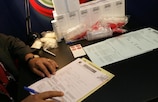Doping control officers key to UEFA's anti-doping drive
Wednesday, July 5, 2017
Article summary
The UEFA doping control officers are at the front line of the body's comprehensive anti-doping campaign - and UEFA gives them constant training and advice to enable them to carry out their vital job.
Article top media content
Article body
UEFA's comprehensive anti-doping programme is enjoying considerable success – thanks in no small part to the outstanding work being carried out by those who are actually on the front line – UEFA's doping control officers (DCOs).
The DCOs came to Nyon recently for their annual workshop to discuss aspects of their vital job on behalf of European football.
So what is the role of UEFA's doping control officers in the campaign to eliminate doping from football?
DCOs are the face of UEFA's anti-doping programme for the players, the clubs and the officials. UEFA has a team of 59 doping control officers from 30 different countries. All are medical doctors and many also work as a DCO for their National Anti-Doping Agency (NADO).
UEFA expects DCOs to carry out a minimum of six missions per year – some of UEFA's DCOs conduct over 35 missions per season. UEFA expects them to have a thorough knowledge of rules and procedures, and a strong attention to detail.
UEFA appoints DCOs to missions based on their availability, experience, language abilities and nationality – ensuring that DCOs do not test teams from their own country. DCOs can be appointed to 'In-Competition' tests, where they test players after a match, or 'Out-of-Competition' tests, where they test players at the training ground, at the team hotel or at home.
Once given the appointment and the flight details, the DCOs are responsible for managing all stages of the sample collection process, from conducting the draw to delivery of the samples to the laboratory.
DCOs need to have excellent oral and written communication skills, be professional, confident and calm under pressure. DCOs also need to protect the confidentiality of UEFA's testing programme.
"Our yearly seminar is an opportunity for UEFA to keep our DCOs’ knowledge and practical skills up to date," said UEFA medical and anti-doping head Marc Vouillamoz.
"It complements our audit programme, in which all DCOs are regularly assessed while performing doping controls. The overall objective is, of course, to provide our DCOs with the training and support that is necessary to ensure that UEFA has one of the best testing programmes in world sport."
EURO success
The success of the testing programme for UEFA EURO 2016 in France emphasised the work being done by UEFA, its doping control officers and national anti-doping agencies (NADOs) across Europe, and has been underlined by the French NADO 'Agence Française de Lutte contre le Dopage' (AFLD), which worked in close conjunction with UEFA for the tournament.
In the largest-ever anti-doping programme conducted at a European Championship final round, none of the 2,242 samples collected within the framework of the testing programme were positive.
"The coordination planned in advance between AFLD, other national agencies and UEFA was, without doubt, key to the success of the arrangements put in place for the EURO," AFLD said in its annual report for 2016.
Want to know more about UEFA's role in the fight against anti-doping? Click here







